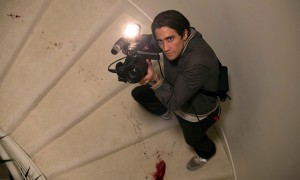An Avalanche of Actors
Birdman or (The Unexpected Virtue of Ignorance) (2014) 3/4

continuous long take.
Tasty, ironic, incisive, and savagely audacious, Birdman or (The Unexpected Virtue of Ignorance) is a weird brew of backstage black comedy and theatrical satire, a volcano of creative ideas in full eruption, and a dark comedy of desperation buoyed by unbridled artistic optimism. It will make you laugh out loud and curse the shadows; spinning you around six ways from Sunday.
Riggan Thomson (Michael Keaton) is a washed-up actor who abandoned the Birdman franchise to reinvent his career by directing and starring in an adaptation of Raymond Carver’s short story “What We Talk About When We Talk About Love.” After the lead is injured, Riggan replaces him with famous method actor Mike Shiner (Edward Norton, The Grand Budapest Hotel). The play is produced by best friend Jake (Zach Galifianakis) and stars girlfriend Laura (Andrea Riseborough) and actress Lesley (Naomi Watts, The Impossible); his assistant is estranged daughter Sam (Emma Stone, Easy A). Riggan’s ex-wife Sylvia (Amy Ryan, Win Win) is tepidly supportive; New York Times critic Tabitha (Lindsay Duncan) is openly hostile.
It’s a rich, startling, and multi-layered collage; finding writer-director Alejandro González Iñárritu (Amores perros, 21 Grams) in the mood for play; creating a meta-universe of mirrors, prop guns, and performances upon performances; and with a mighty cast that fields every pitch he throws. The film’s built around a role that Keaton had to become a has-been to play, and the long-missed actor delivers impressively. Norton and Stone get the punchiest scenes (two on a rooftop) and use them to full advantage; they’re instant Oscar-nomination reels.
Iñárritu’s overheated technique meshes perfectly with the overacting – the performers know Birdman’s a theatrical exercise and relish the chance to pull out the stops. Dazzling and rambling, intimate and sprawling, it’s a jubilant ride; a full-fledged wonder of showbiz about showbiz. Funny and fast-moving, the bravura gestures balance the film’s mystical ideas with a steady stream of inside jokes. Drummer Antonio Sanchez provides a hustling backbeat throughout – a thrumming, off-the-cuff, jazz percussion score.
As a simulated single-take of almost two hours, Birdman sizzles, scintillates, teases, taunts, barks, brays, preens, and careens with limitless energy. (To be clear, Hitchcock’s Rope did the same thing without digital trickery more than half a century ago.) Still, it’s a remarkable feat of choreography – everything had to be timed as in a dance. World-class cinematographer Emmanuel Lubezki (Children of Men, The Tree of Life, Gravity) wows once again with jaw-dropping cinematography that spins, pirouettes, and stays aloft scene after scene.
Serious, silly, and self-aware, Birdman questions stardom and celebrity, punctuated by humour that verges on slapstick; its tone is at once empathetic and acidic. Yet there’s an underlying anger in evidence, a rage against a movie market that champions superhero blockbusters and sidelines the talent that provokes discomfort. With its improvisatory style, its seamless shots, its surrealistic flourishes, and its well-calibrated shifts, Birdman provides an unpredictable response to the sea of mediocre formula at the centre of its critique. It makes an argument that everything flows together.
Like so many other films in 2014, Birdman proves that a kinetic film can soar on the wings of its technical prowess, even as the banality of its ideas threatens to drag it back to earth. Don’t get me wrong – the occasional downdrafts can’t keep Birdman from taking to the skies. It dips, and it also takes thrilling flight. But it’s hard not to leave with the suspicion that it signifies less than Iñárritu would have us believe.
Playing off the exaggerated conceits of Dogville, the documentary camerawork of The Wrestler, the thematic ambition of Synecdoche, New York, and the technological touchstones of The Social Network, Birdman ascends to great heights. It may not be as scalpel-sharp a dissection of Broadway, Hollywood, and fame in the 21st century as it thinks it is, but it’s a galvanic blast from start to finish. As suggested by the clever subtitle (a Kubrickian tribute, perhaps), blundering can be bliss.
Force Majeure (2014) 3/4

Gleefully uncomfortable, deliciously awkward, and corrosively funny, Force Majeure is a comedy of passive aggressiveness with a nerve-cinching grip, delivered with Kubrickian unease. Plotted with forensic exactitude, it’s a quiet avalanche that leaves the audience squirming in all the best ways.
A family takes a five-day ski holiday in the French Alps. During lunch at a mountainside restaurant, an avalanche turns everything upside down. The anticipated disaster fails to occur, but in the aftermath, the quartet is torn apart by cowardice as their dynamic is shaken to its core. Tomas (Johannes Kuhnke), the family’s patriarch, struggles desperately to reclaim his role as family patriarch, but mother Ebba (Lisa Loven Kongsli) refuses to let him off the hook.
Mightily clever in its rather theatrical structure and bracingly cinematic in its formal approach, Force Majeure is a prickly moral comedy for grown-ups, full of spectacular scenery, sharply observed moments, and masterfully manipulated atmosphere. An arrangement of the stormy Summer finale from Vivaldi’s “Four Seasons” keeps the viewer in jittery anticipation, adding caustic condemnation through ice-cold humour.
Swedish writer-director Ruben Östlund (Involuntary, Play) is a gifted creator of malignant ambience, a glacial and ever-more-confident stylist, and a brutal satirist of his countrymen’s foibles, presumptions, and hidden prejudices. Like Bergman with a wicked streak, Östlund never pushes his own metaphors too far. In Tomas, Östlund diagnoses traits of stunted male egotism and whopping immaturity, matched with a warped desire to look like a hero; Ebba, meanwhile, is far from blame-free, especially in agreeing to present a “united front” to their children.
Expertly directed and frequently hilarious, Force Majeure is a sophisticated thought experiment, provocative and wise, exploring the consequences of male weakness in a world in which men are expected to be strong at all times. Each new wrinkle in the scenario makes you squirm and recognize some rarely-broached truth. It’s a penetrating study of that most ludicrous of social pretences – masculinity, toxic and ubiquitous – with secret reserves of compassion once you’ve peeped out from between your fingers.
Building riotously via a series of verbal takedowns as male authority goes limp in the wake of a regrettable impulse, the film becomes a viciously amusing takedown of bourgeoisie complacency and gender stereotypes, chronicling the emotional free fall that occurs when a man and his marriage can’t live up to impossible expectations. A testy, laugh-as-you-wince experience that makes you murmur in amazement as you brood on the darkest corners in our lives, it rubs your face in human frailty and the illusion of security as relentlessly as anything in Michael Haneke’s oeuvre.
Östlund skips a perfect ending to reach an ambiguous final act that’s not as neatly satisfying, and it’s not as unflinching as 2010 chart-topper Blue Valentine. Yet, despite the chilly setting and snowy veneers, it has a heart that burns wickedly, airing out the dirty laundry for all to see. Indeed, it’s the harshest date movie to come out of the European arthouse circuit since Charlotte Gainsbourg stuck a pair of rusty scissors between her legs. (Maybe watch it alone, though for the record, I’d die for you, baby.)
While we may still be waiting for a new Bergman, his native country has ne’er slowed down; two of his colleagues have arrived at third-time’s-the-charm efforts during the 2013-2014 festival season – Lukas Moodyson’s adorably optimistic ode to teenage punk stunned Toronto last year; and Roy Andersson’s incomparable black comedy won the Golden Lion at Venice. Now Östlund himself looks to be in serious contention for a Foreign Language Film nomination. Fifty-seven years after Death sat down to a chess match with a young Max von Sidow, the Swedes are pulling their weight.
Nightcrawler (2014) 3/4

Electrically overblown, wickedly funny, and mercilessly exact, Nightcrawler is a caustic portrait of an amoral opportunist who stumbles upon a horrible calling, playing like an entrepreneurial David Cronenberg crime thriller and unfurling into a ghoulish satire on journalism and the job market. With its pungent premise and potent performances powering it up, it curves and hisses its way inside your skull with demonic skill.
Lou Bloom, an unemployed nocturnal scavenger, captures the most gruesome mayhem on LA’s graveyard streets through freelance videography and sells to the highest bidder. His tenacity and manufactured poise catches the eye of Nina (Rene Russo), a past-her-prime news shark anxious for improved ratings. They form a poisonous and profitable relationship.
Nightcrawler’s chief pleasure is watching Jake Gyllenhaal (Prisoners, Enemy), who dropped 20 pounds to play the ambulance-chasing hack, portray someone who’s a spin-off of at least four iconic characters: Nosferatu, Travis Bickle from Taxi Driver, Max Fischer from Rushmore, and Chuck Tatum, the unscrupulous reporter played by Kirk Douglas in Billy Wilder’s scabrous Ace in the Hole. Gyllenhaal, under-recognized for his convincing turns in Donnie Darko, Brokeback Mountain, and Zodiac, completes a career rejuvenation in Nightcrawler.
Bug-eyed and manically vulnerable, unhinged but precisely pitched, Lou is a magpie; a demented bottom-feeder, a neon-lit survivalist mauling his way across LA, the flip side of Ryan Gosling in Drive, playing the angles and filling space with empty words instead of soulful silences. Coiled and ready to spring, he’s as transfixing as a cobra in a snake charmer’s outfit, just as much a bloodsucker as Dracula. Suave, reptilian, and terrifying, he’s the MacGyver of masturbatory shut-in Googlers, raised in a cramped crawlspace on Robert Kiyosaki books. It’s adolescent solipsism gone grotesquely rancid.
With his emaciated frame and robotic enthusiasm, Lou is one of the most disturbing movie characters of the year, like a Wes Anderson character whose ambition has warped into a realm of violent sociopathy. The courageous and counterintuitive pairing of its leads – Russo is 60, Gyllenhaal is 33 – produces undeniable erotic chemistry. Nightcrawler has a sulphuric quality and sick sense of humour that mirrors the muted aquarium that Los Angeles becomes after the sun goes down.
In his directorial debut, screenwriter Dan Gilroy executes his ideas with coolness, and Nightcrawler also has a caffeinated spirit worthy of its graveyard shift milieu, a darkness artfully breached by PTA-regular Robert Elswit (Boogie Nights, Magnolia, There Will Be Blood), perhaps the best cinematographer in the business. However, like his erratic protagonist, Gilroy doesn’t always know when to settle down – it’s a bit too outlandish and loathsome, and the spell’s broken as soon as plot overtakes mood.
Half of the script sounds like it was gleaned from a self-help book; the other half sounds like the ramblings of a delusional narcissist in need of professional help. Some of the cleverest phrases are actually tired clichés (the decades-old adage “If it bleeds, it leads”), while others are browbeaten repetitively to the point of aggravation (“My motto is, ‘If you want to win the lottery, you have to make the money to buy a ticket’”).
Eager to shock but reluctant to reveal, Nightcrawler’s scolding tone runs counter to its pulp energy, as if Gilroy is instructing the audience to be alarmed by the things that turn them on. The film offers a familiar vision of today’s producers as misery peddlers, and callow ratings slaves bordering on the monstrous. Some clunky exposition and on-the-nose thematic monologues result in a rocky start, and it’s not wholly in control of its pay-off, Lou’s graceless and unnecessary face-off at a police station. No matter how much it strains to be Network meets The Silence of the Lambs, it’s never as effective as any of its many brilliant predecessors.
But Gyllenhaal’s wickedness prevails. Sleaze coats every frame of Nightcrawler, and some of it is deliriously thrilling. As much as it intends to be a takedown of the media’s pandering, “think-of-our-network-as-a-screaming-woman-running-down-the-street-with-her-throat-cut” ethos, the nauseating, vehicular lunacy is the versatile secret weapon. Full of evil that descends like a toxic cloud upon a tainted city, Nightcrawler is a tribute to the vile, a morbidly macabre carnival. It’s a skeezy, delectable little noir well worth a prowl.
For more reviews, visit Absurdity & Serenity at absurditys.wordpress.com.
